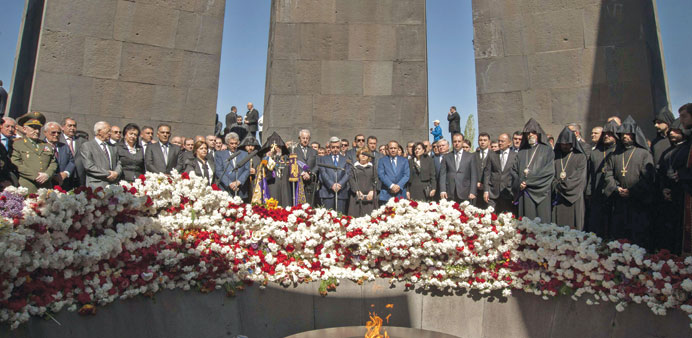AFP/Yerevan
Armenian President Serzh Sarkisian has brushed off Ankara’s first-ever offer of condolences for the World War I mass killings of Armenians under the Ottoman Empire, accusing Turkey of showing “utter denial” in failing to recognise the massacres as genocide.
In an unprecedented move described by the United States as a historic gesture, Turkish Prime Minister Recep Tayyip Erdogan on Wednesday offered condolences over the massacres, calling them “our shared pain”.
But in a statement marking the 99th anniversary of the start of the killings and mass deportations, Sarkisian made no acknowledgement of Erdogan’s move and instead accused Turkey of continuing to ignore the facts.
“The Armenian genocide ... is alive as far as the successor of the Ottoman Turkey continues its policy of utter denial,” he said.
“The denial of a crime constitutes the direct continuation of that very crime,” he added. “Only recognition and condemnation can prevent the repetition of such crimes in the future.”
Sarkisian’s chief of staff Vigen Sarkisian went even further, saying that Erdogan’s “statement is yet another, perhaps more advanced expression of denying and concealing the crime of the Armenian genocide”.
“There are all the theses of the Turkish propaganda machine, which are already known to everyone, including viewing the victim and the executioner on the same level,” he told the Armenpress news agency.
The iconic French singer of Armenian descent, Charles Aznavour, strongly criticised Erdogan for his failure to accept the term genocide.
The term “condolences” used in Erdogan’s statement cannot be interpreted “as a recognition and even less as an offering of apologies”, the 90-year-old world-renowned musician wrote in a statement to AFP.
Yesterday was a day of national mourning in Armenia and requiem masses were held in churches across the country marking the 99th anniversary of the massacres.
All national television channels ran live broadcast of the annual ceremony which saw thousands of Armenians flocking to a hilltop memorial above Yerevan to lay flowers at the eternal flame.
“I came here for the first time with my father when I was a five-year-old, today I came here with my grandson and he knows what we expect from the world and from Turkey,” Narine Balayan, a 58-year-old resident of Yerevan, told AFP. “I do hope that when he comes here with his grandchildren all problems with Turkey will be resolved.”
In Istanbul, commemorations also took place but on a far smaller scale, gathering just a few hundred people.
A group calling itself “The Platform for the Commemoration of 24 April’s Armenian Genocide” organised the rally on the steps of the Haydarpasa train station, from where the first convoy of Armenians were deported on April 24, 1915 after being rounded up by the authorities.
The group members carried black and white photos of deportees and a banner that read: “We commemorate the victims of Armenian genocide: some wounds do not heal with time.”
“Yes, it is true. This is our shared pain. We are here to share the pain of Armenians,” activist Levent Sensever said.
Another demonstration was to be held later in Taksim Square, a traditional rallying point which was the scene of mass anti-government protests in June.
Erdogan acknowledged that the events of 1915 had “inhumane consequences” but also said it was “inadmissable” for them to be used as an excuse today for hostility against Turkey.
Traditionally, thousands of members of the Armenian diaspora arrive in Yerevan to take part in the ceremony.
This year saw many Armenians from conflict-ridden Syria – descendants of those who fled Ottoman persecution in 1915 – return to the ancestral homeland.
Sarkisian said yesterday that the fate of Armenians in Syria “is our open wound and the issue of our primary concern”.
Using both diplomatic levers and its influential diaspora abroad, Armenia has long sought to win the massacre’s international recognition as genocide.
Armenians say up to 1.5mn people were killed during World War I as the Ottoman Empire was falling apart, a claim supported by several other countries.
Turkey argues 300,000 to 500,000 Armenians and at least as many Turks died in civil strife when Armenians rose up against their Ottoman rulers siding with invading Russian troops.
More than 20 countries have so far recognised the massacres as genocide.

Sarkisian, Armenian Apostolic Church leader Catholicos Garegin II, and top officials hold a moment of silence after laying flowers at the monument to
